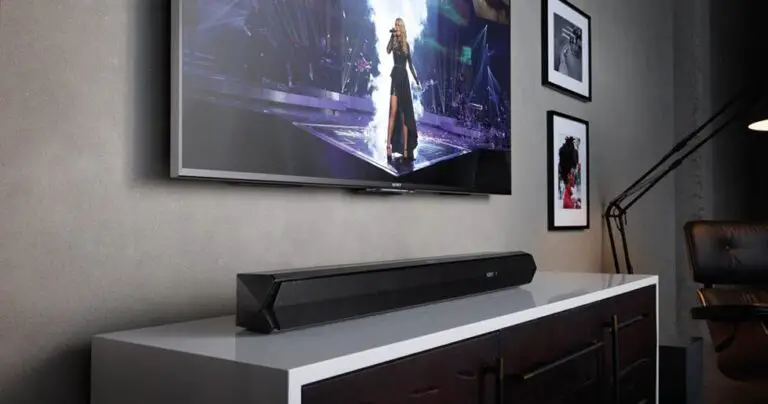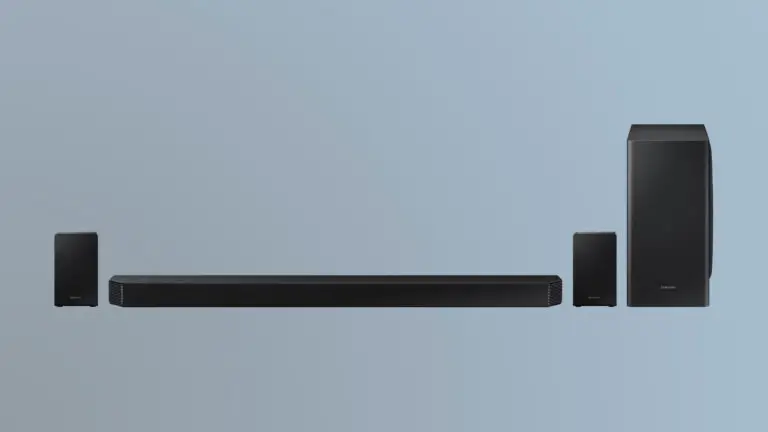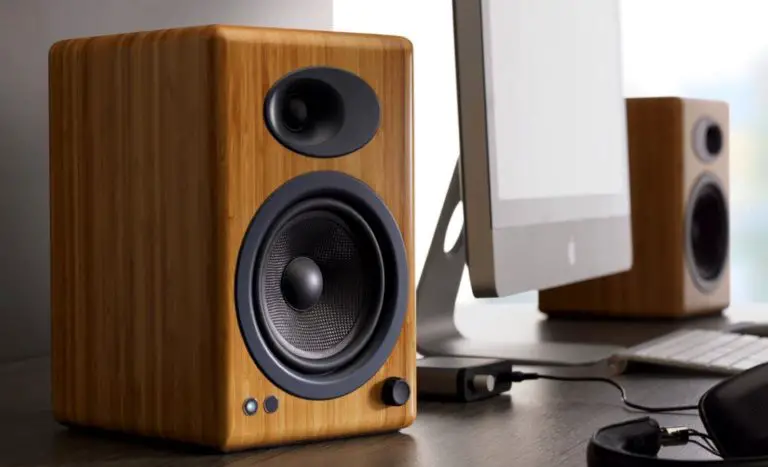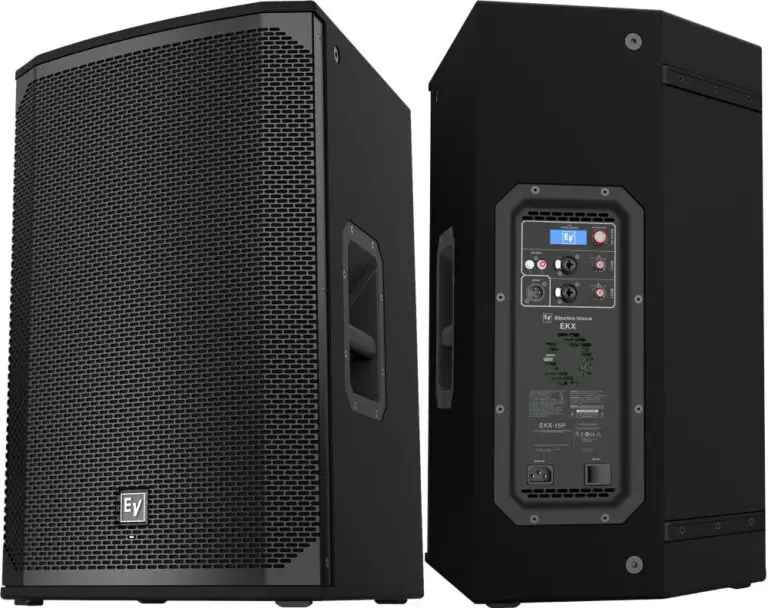Soundbar Vs Bookshelf Speakers: Which one is best? Choosing the perfect audio system for your home entertainment can be a daunting task, especially when you’re trying to decide between a soundbar and bookshelf speakers. Sound quality, longevity, and convenience are all crucial factors to consider in your decision-making process. Are you looking for a simple, space-saving solution? Or perhaps you’re more interested in a high-fidelity audio experience that will last for years to come? In this article, we’ll guide you through the key differences between soundbars and bookshelf speakers so you can make an informed choice.
As you dive into your home audio options, it’s essential to weigh the pros and cons of each system. While figuring out which of these alternatives will best suit your needs, remember to evaluate the available features, such as the number of channels, subwoofers, and overall performance. Ready to make your entertainment experience truly immersive? Let’s get started.
Key Takeaways
- Understand the differences between soundbars and bookshelf speakers for a better audio experience
- Convenience versus quality: consider what matters most for your home entertainment setup
- Assess the features and functionality of each option to make an informed decision
Check out this informative video:
Soundbar Vs Bookshelf Speakers:
When deciding between soundbars and bookshelf speakers, there are several factors to consider, such as size, sound quality, and setup. Soundbars are compact and versatile, making them an ideal choice if you want a space-saving speaker system that is easy to place on any flat surface. They also provide great high-frequency extension and bass performance, suitable for music and movies.
On the other hand, bookshelf speakers have a smaller footprint and can be easily moved from room to room. Their smaller size makes them easier to mount without worrying about them moving around or hitting walls. Regarding durability, bookshelf speakers are the better option, as they tend to last longer than soundbars which often need to be replaced every few years.
While soundbars offer the advantage of being more compact and having good sound quality, they can also be too big for small rooms, making the space appear darker and obstructing the view of the television. With their smaller size, bookshelf speakers can be a better fit for any room, allowing for easier installation next to your TV.
Some modern soundbars also come with built-in Bluetooth, Wi-Fi, or HDMI connectivity, providing easy integration with your home entertainment system. However, you’ll want to connect a wireless soundbar to your TV properly to enjoy an optimal audio experience.
In summary, when choosing between soundbars and bookshelf speakers, consider factors such as sound quality, size, setup, and additional features to balance functionality and aesthetics for your specific needs.
Do Sound Bars Make a Difference?
When considering a new audio setup, it’s natural to wonder if sound bars make a noticeable difference in your listening experience. The answer is yes, they do make a difference in various aspects of audio quality and convenience.
Firstly, sound bars help in blocking out external noises, providing you with a comfortable, noise-free environment. This is especially useful when playing piano, listening to music, or enjoying audiobooks.
By creating a dedicated listening area, sound bars can enhance the dynamic range and soundstage of your setup. They let you enjoy music, movies, or gaming with immersive sound quality and powerful bass.
Different types of sound bars are available, such as bass reinforcement or bass reflex. Bass reinforcement sound bars improve bass quality by making it softer or boosting its volume, allowing you to enjoy a comfortable listening experience.
In terms of volume, a sound bar with a high sound output level allows you to hear your music clearly without needing to turn up the volume on your speakers. This ensures you can maintain the same loudness while enjoying superior sound quality.
Some sound bars have advanced audio technology like Dolby Atmos, giving you a more detailed and dynamic listening experience.
But before you go ahead and buy a sound bar, make sure it fits the style of your room and the features of your current equipment. Moreover, consider your budget, and if you have multiple uses, consider buying different types of sound bars to cover all your needs.
Remember that using sound bars is not just about better sound; they can also create a relaxing environment to help you unwind after a busy day. Therefore, it’s essential to try out a sound bar in a setting that you enjoy the most.
In conclusion, sound bars make a difference in audio quality, power output, frequency response, and listening experience. With several options available, you can find the perfect sound bar that suits your preferences and needs. So, enhance your audio setup with a sound bar to experience incredible sound quality like never before.
Which One is Best: Soundbar or Home Theater?
So, you’re trying to decide between a soundbar or a home theater system. There’s no one-size-fits-all answer, but let’s dive into some factors that can help you decide the best choice for your needs.
First, consider your desired setup. Do you want a soundbar speaker system with a TV, or are you looking for a full home theater experience with a projector? Keep in mind, that a subwoofer may be included with certain setups, enhancing the overall audio experience.
Next, discuss the difference between center and rear speakers in a surround sound system. A center speaker distributes sound from all front speakers in a group, while rear speakers enhance individual speaker sounds. Soundbars can also use this concept, rear speakers, and a subwoofer for a more immersive experience.
Regarding movies, you may prefer a larger screen and more powerful speakers. However, a smaller screen and speaker system might suffice for smaller movies or high-quality audio. Soundbars can handle larger screens and more speakers, making them a versatile option for different types of films.
Consider your desired overall system setup. If you’d like a combination of soundbars, a projector, and a TV sound system, weigh the pros and cons of each. Movie enthusiasts may prefer a system similar to a theater without distractions, whereas others may opt for a minimalist system with a simple screen and no speakers.
Before buying a home theater, consider the main components you want and the available space in your room. You might want to explore soundbars in various sizes to accommodate different rooms. A smaller system might be better if you have a large room, while an average-sized room may benefit from a larger sound setup.
In summary, soundbars are a versatile option for various home theater configurations. The decision between a soundbar or a home theater system depends on your preferences, available space, and the desired audiovisual experience you want to create. Whether you install it yourself or hire a professional, either option can provide a fantastic home entertainment experience.
Are Bookshelf Speakers Better Than a Soundbar?
When considering your home entertainment system, you might wonder if bookshelf speakers are a better option than a soundbar. Both options have benefits but ultimately depend on your preferences and needs.
Soundbars are a great choice if you desire a sleek and unobtrusive system, offering a stylish look that lets you view the audio source while it’s playing. They provide access to higher frequencies which is perfect for movies and other content that requires impressive sound quality in specific frequency ranges. Additionally, soundbars often offer more bass without sacrificing clarity.
On the other hand, bookshelf speakers allow you to enjoy the audio without visually focusing on the source. Bookshelf speakers make an excellent choice for an indoor theater experience. Though soundbars may be more expensive, they offer unique features that enhance your overall audio experience. Some soundbars have built-in surround sound receivers, providing outstanding quality and performance.
Size is another factor to consider. A soundbar might be the better choice if you have a larger TV, as they conveniently fit various screen sizes. It’s a good idea to choose a soundbar that matches the dimensions of your TV to maintain a cohesive aesthetic.
Larger drivers, woofers, and tweeters are some of the components in bookshelf speakers that contribute to their enhanced audio quality. They also boast a sensitivity rating and input impedance that can improve your listening experience. They usually have built-in amplifiers and can act as versatile stereo speakers.
In summary, both soundbars and bookshelf speakers provide unique audio experiences with their own set of advantages. Think about factors such as what you’ll be using them for, the space you have available, and your budget, and keep in mind the above information when making your final decision. Whatever choice you make, rest assured that your entertainment experience can be fulfilling.
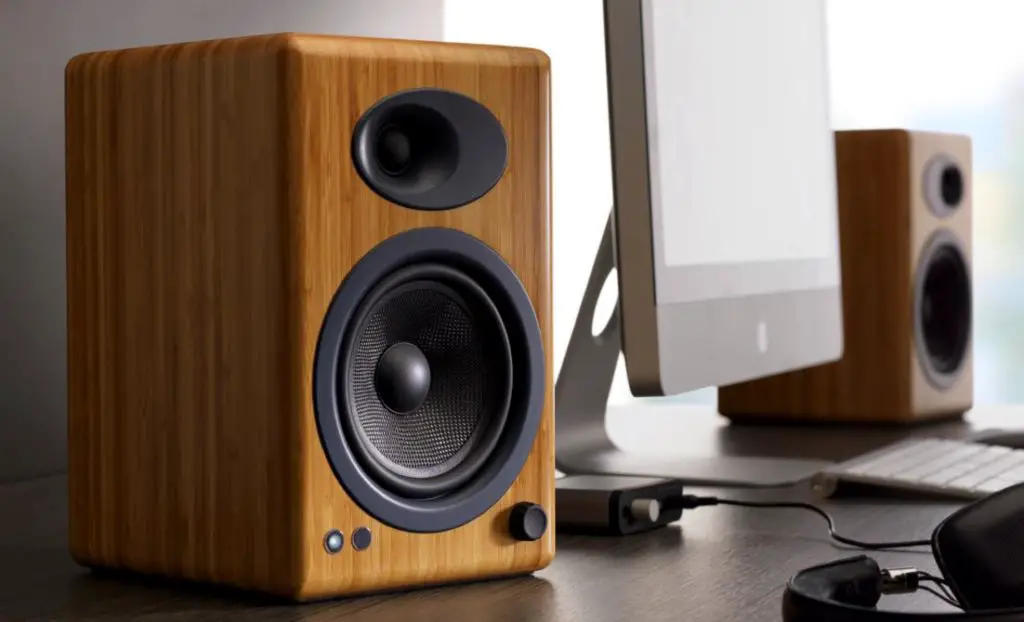
Wrapping Up Your Decision
When considering your home audio options, ponder your budget and the value you want from the purchase. A good bookshelf speaker may be worth the extra cost, and you might even want to pair it with a surround sound receiver. Remember that some speakers come with a built-in amplifier for enhanced sound quality.
Investing in quality bookshelf speakers can be more challenging for your wallet than a soundbar or average speaker. However, when it comes to home theater systems, it’s crucial to remember that the ultimate goal is to get what you pay for. The sound experience from an upgraded audio setup will justify the additional expense.
Frequently Asked Questions
Which is better for TV audio: a soundbar or bookshelf speakers?
When it comes to TV audio, choosing between a soundbar or bookshelf speakers depends on your preferences and room size. Soundbars are sleek, take up less space, and provide a decent audio experience, especially for movies and dialogues. On the other hand, bookshelf speakers offer a wider sound stage and high-quality audio but require more space and may need additional setup.
How do soundbars compare to 2.1 speaker systems?
Soundbars usually combine multiple drivers in one unit, creating an immersive soundstage and often include a wireless subwoofer for bass. A 2.1 speaker system comprises two speakers and a subwoofer, offering better stereo separation and a more refined audio experience. However, soundbars have the advantage of being simpler to set up and are a space-saving option.
Can bookshelf speakers be used effectively with a TV?
Yes, bookshelf speakers can be used effectively with a TV. They provide excellent sound quality and can be paired with an AV receiver for multi-channel audio. However, they may require more space and wiring compared to a soundbar. If you appreciate high-quality audio and have the space for bookshelf speakers, they can be a great option for your TV setup.
What are some alternatives to using a soundbar?
Besides soundbars and bookshelf speakers, you can consider options like surround sound systems, tower or floor-standing speakers, or even headphones with lengthy cable or wireless capabilities as alternatives for your TV audio.
How do high-end soundbars like Sonos Arc compare to bookshelf speakers?
High-end soundbars like the Sonos Arc offer advanced features such as Dolby Atmos support, smart speaker integration, and wireless connectivity. While they deliver impressive sound quality, bookshelf speakers generally provide a wider sound stage and more precise audio due to their separate left and right channels. Bookshelf speakers may be the better choice if your main focus is on sound quality. However, high-end soundbars may be suitable if you want the latest features and a sleek design without compromising too much on audio quality.
Which is the best option for movie audio: a soundbar or bookshelf speakers?
Both soundbars and bookshelf speakers have their pros and cons when it comes to movie audio. A soundbar offers ease of setup and space-saving design, is well-suited for dialogues, and often comes with a wireless subwoofer for bass. Bookshelf speakers, on the other hand, provide a wider sound stage and more accurate audio but may require extra space and a more complicated setup. Your choice depends on the importance of audio quality and the available space for your home theater setup.

